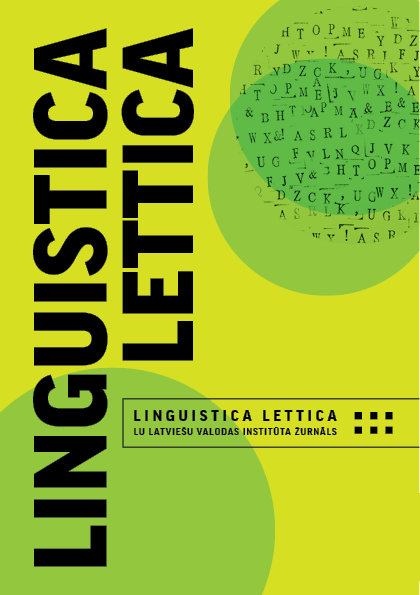
Linguistica Lettica is a scientific journal published annually by the Latvian Language Institute of the University of Latvia, or UL (Latvia). The journal has been published in print since 1997. All electronic versions of Linguistica Lettica issues are available on the website of the Latvian Language Institute and in the repository of UL e-resources.
Scope
The journal focuses on Baltic linguistics with a strong emphasis on the comprehensive study of the Latvian language, its contact with other languages in Latvia and around the world, and other languages spoken in Latvia. However, experts from other disciplines are also invited to submit disciplinary and interdisciplinary papers on topical language issues, research theories, and methodologies.
In 2021, the editorial board of Linguistica Lettica began a new tradition of thematizing each issue of the journal around certain topic, theory, or method; each such theme can be viewed from both a disciplinary (linguistics) and interdisciplinary point of view, thus expanding our understanding of certain things and developing new scientific perspectives in Latvia. The description of each issue’s theme is announced in advance here, on the website of the Latvian Language Institute, during the annual Jānis Endzelīns commemoratory conference in Riga (Latvia), alongside a public call for submitting journal papers.
The aims in choosing each issue’s theme are: (1) to help authors look at their research topics from a different perspective, (2) to encourage researchers to search for and test new theoretical and methodological frameworks, and (3) to create a conceptually unified journal, helping readers navigate its range of scientific papers.
Originality and language
Linguistica Lettica publishes original, previously unpublished papers and reviews of current topics in Baltic linguistics by renowned experts and young researchers in Latvian, Lithuanian, English, and German.
Editorial board and reviewers
Linguistica Lettica has an international editorial board consisting of linguistics experts from Latvia, Australia, Estonia, Finland, and Switzerland. In addition, foreign specialists are invited as anonymous reviewers, who evaluate the scientific quality and relevance of the submitted papers.
Publishing and re-publishing policy
Papers are published free of charge in Linguistica Lettica after receiving positive reviews. Each issue of the journal is published open-access, in print and electronic form. The copyright of the papers published in the journal belongs to the authors and the Latvian Language Institute. Reference is mandatory when quoting or republishing.
ISSN 1407-1932
The deadline for the submission of scientific papers: May 23, 2025.
Editors-in-Chief
Solvita BURR, Latvia/USA, University of Latvia / University of Washington
Editor assistant
Kristīne MEŽAPUĶE, Latvia, University of Latvia
Editorial Board
Ilze AUZIŅA, Latvia, University of Latvia
Laimute BALODE, Latvia / Finland, University of Latvia / University of Finland
Ina DRUVIETE, Latvia, University of Latvia
Irēna Ilga JANSONE, Latvia, University of Latvia
Daiki HORIGUCHI, Japan, Kyoto University
Diāna LAIVENIECE, Latvia, Liepaja Academy of the Riga Technical University
Sanita MARTENA, Latvia, Rezekne Academy of Technologies
Sanda RAPA, Latvia, University of Latvia
Daiva SINKEVIČIŪTĖ-VILLANUEVA-SVENSSON, Lithuania, Vilnius University
Anna STAFECKA, Latvia, University of Latvia
Michal ŠKRABAL, Czech Republic, Charles University
Agris TIMUŠKA, Latvia, University of Latvia
Lembit VABA, Estonia, Institute of the Estonian Language
Pēteris VANAGS, Latvia / Sweden, University of Latvia / Stockholm University
Andrejs VEISBERGS, Latvia, University of Latvia
This year we celebrate the 500th anniversary of the first book published in Latvian. The neighboring nation of Estonians is celebrating the same anniversary. The exact title of this book, published in 1525, is unknown, because it has not survived to this day. Old documents only record that it most likely described the order of the Lutheran church service and that all its copies were burned in the Lübeck town hall square.
Although this book never reached readers, it was followed by more successful editions several decades later, which allow modern researchers to investigate the older stages of the language’s development. For example, the works by Georg Mancelius, Christoph Fürecker, and Johann Ernst Glück became the basis for the creation of the Latvian written language.
The Latvian language has developed into a language of culture and science over the past half-millennium, a language used in the digital environment, and a language with two written forms and many sub-dialects that are still alive today.
Issue 34 of the journal “Linguistica Lettica” is dedicated to the development of Latvian and other Baltic and Baltic region languages in a broad sense.
Scholars from various fields of the humanities and related research fields are invited to submit articles devoted to:
Terms and conditions for submitting manuscripts to the journal “Linguistica Lettica”
Editors of the journal issue are Dr. Anna Frīdenberga and Dr. Anta Trumpa
Note: The journal will include articles that meet the scope of the journal issue and the requirements for article formation, and that have been positively evaluated by the editors and reviewers.
NB! If you have not received a confirmation letter within a week, please contact linguisticalettica@gmail.com.


Latvian Language Institute
of the University of Latvia
Kalpaka bulvāris 4
Rīga LV-1050
Latvia
☏ 371 67034016
Follow us
© All rights reserved